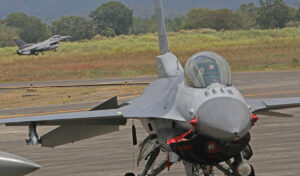By John Victor D. Ordoñez, Reporter
THE potential purchase of F-16 jets by the Philippines from the US is not meant to harm the interests of any nation including China, a Philippine security official said on Thursday.
National Security Council spokesman Jonathan E. Malaya assured China the acquisition is not intended as a threat to any nation and is just part of Philippine efforts to modernize its military.
“We would like to assure the People’s Republic of China that the planned procurement of the F-16 fighter jets to the Philippine arsenal does not in any way harm the interest of any third party,” he told a news briefing.
“It is not intended for any nation. It is merely part of the Armed Forces of the Philippines Modernization Program,” he added.
At a news briefing in Beijing on Wednesday, Chinese Foreign Ministry spokesman Guo Jiakun said the Philippines’ defense and security cooperation with other countries should not “exacerbate regional tensions.”
He added that the F-16 is the most advanced fourth-generation fighter in the world and could be a “significant upgrade” to Manila’s existing arsenal, which includes 12 FA-50 fighter jets from South Korea.
The US Department of State on Tuesday approved the possible sale of F-16 jet fighters and munitions worth $5.58 billion to the Philippines, a deal that could boost the Southeast Asian nation’s air combat capabilities amid rising tensions with China.
The US government greenlit the Philippines’ request for 20 units of F-16 fighters from Lockheed Martin Corp., according to the Defense Security Cooperation Agency (DSCA), an office attached to the US Defense department.
The proposed arms deal includes missiles, bombs, radar units, backup jet engines and engineering and technical support services for the planes, the DSCA said in a statement posted on its website. It has informed the US Congress of the potential deal.
Foreign military sales by US defense manufacturers require US government approval to ensure that weapon acquisitions of other nations align with Washington’s foreign policy and security interests.
Mr. Malaya said the US government had not officially communicated the approval to the Philippines.
US Defense chief Peter Brian Hegseth met with his Philippine counterpart Gilberto Eduardo Gerardo C. Teodoro, Jr. and Philippine President Ferdinand R. Marcos, Jr. on March 28 to discuss continued cooperation on keeping the peace in the Indo-Pacific region and South China Sea.
During his visit to Manila, the US Defense chief said the US Naval Mobile Launchers with Enhanced Strike System missile system during the yearly Balikatan (shoulder-to-shoulder) joint military exercise this month.
Washington also plans to deploy an anti-ship missile system and highly capable unmanned surface vehicles, which Mr. Hegseth said would let US and Philippine forces “train together using advanced capabilities to defend the Philippines’ sovereignty.”
“Secretary Hegseth’s visit and explicit message of commitment to accelerate the progress of US-Philippine relations should translate into more tangible benefits and gains in terms of military assets, which Manila badly needs to protect its borders,” said Arjan P. Aguirre, who teaches political science at the Ateneo de Manila University.”
Manila has been at the forefront of efforts to contest Beijing’s expansive sea claim, deepening security ties with Western countries and regional allies like Japan and Australia.
More than $3 trillion worth of trade passes yearly through the South China Sea, which China claims almost in its entirety. A United Nations-backed tribunal in 2016 voided its claim for being illegal.
China has expansive claims in the South China Sea that overlap with the exclusive economic zones of Brunei, Indonesia, Malaysia, the Philippines and Vietnam.

